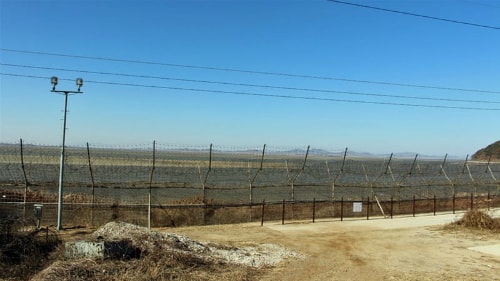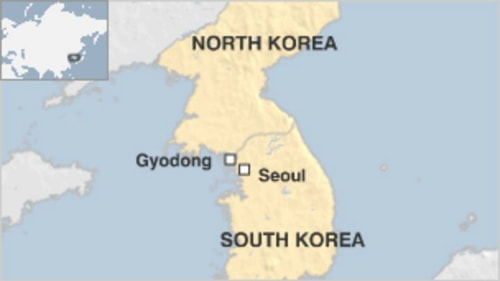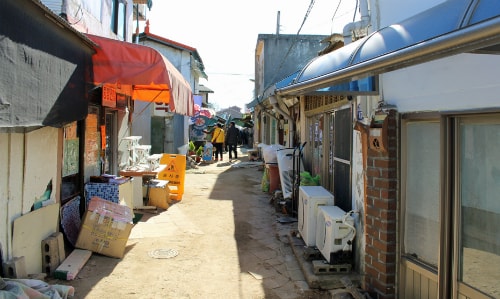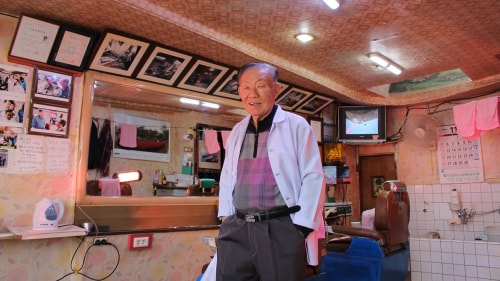Life with time stopped near North Korea
People on Gyodong Island, South Korea still enjoy a peaceful life despite increasing tensions with North Korea.
 |
People standing on Gyodong Island can see North Korean territory behind the fence. Photo: Al Jazeera. |
Soldiers with rifles guard residents and tourists as they pass through a military checkpoint on a long bridge connecting mainland South Korea with Gyodong Island, just a few kilometres from North Korean territory, according to Al Jazeera.
Despite constant talk of war on the Korean Peninsula, once on Gyodong Island, visitors do not find the community preparing for conflict. Instead, longtime residents are busy welcoming the growing number of tourists and trying to make a living in this rural, low-income area.
Where time stops
Korean media sometimes refer to Gyodong as “the land where time stops.” Since the first bridge connecting the island to mainland Korea was built in 2014, many people have flocked here to see what looks like a village life from the 1970s. Some are looking for a place to relax and escape the stress of busy city life.
Amid growing concerns about the risk of conflict with North Korea, many also travel to Gyodong to see the secretive nation up close.
 |
Gyodong is located very close to North Korea. Graphics: BBC, |
Lee Young-jin, 48, moved to Gyodong Island seven years ago and has been working as a teacher. A part-time translator and an avid reader, she longed for a peaceful life. When she decided to move to Gyodong with her son, Lee was not worried about the threat of war with North Korea, and she still has no worries.
"People on the island think that if war breaks out, North Korea will attack Seoul or other major cities. Gyodong is too small a target, it has no symbolic significance. Paradoxically, like the calm in the eye of the storm, people feel safer here," she said.
There are several factors that separate Gyodong from modern life. First, the island is located in a remote part of the northwestern tip of South Korea in an area that has seen many deadly clashes between the South Korean and North Korean navies. During the 1950-53 Korean War and the early 1950s, many North Koreans fled to Gyodong and were shunned by the South Korean people.
These Koreans built a market on the island with old shops in run-down alleys. Mr. Ji Gwang-shik was one of them. In 1952, he heard that war was happening near his hometown in North Korea, so he took a boat to Gyodong Island, not knowing that he would never return.
He and other North Koreans cut down trees to build small wooden huts and live in them. Since many could not find work, they started their own businesses. Mr. Ji made a living doing manual labor such as cleaning.
"I was so hungry back then and willing to do anything," he said.
A few years after arriving in Gyodong, Mr. Ji found a steady job in a barber shop and eventually bought it. The interior of the barber shop remains much the same as it was decades ago, with floral wallpaper and beige linoleum floors.Recently, Mr. Ji replaced the transparent windows with frosted mirrors to prevent curious tourists from looking in.
 |
Market on Gyodong Island. Photo: Al Jazeera. |
Gyodong has a clean and open space. Due to its remote location, Gyodong has almost no industry. The air on the island is very clean thanks to the lack of vehicles and the constant sea breeze.
Three years ago, as a wave of South Koreans left the city to start new lives in the countryside, Lee Ghang, 54, moved to Gyodong. He looks after a small Confucian temple on the island and has become something of an amateur local historian. He started a blog posting photos of Gyodong and articles about the island’s history.
“My dream is to live in a small house on an island so I can have time to think and write,” Lee said. He doesn’t earn much money in his current job, but he says the benefits of living on Gyodong Island are worth it.
"I can live on just the sunshine on this island," he said.
Lack of opportunities for young people
However, Gyodong is like other Korean communities in that education is an important factor in building a future life. Korean families often choose to live in areas with access to high-quality schools. Lee’s son will be entering high school in a few years and she hopes he will attend a prestigious school in a big city.
Career opportunities are limited for young people living on Gyodong Island, which has vast areas of fertile rice fields but virtually no industry or high-paying jobs.
 |
Mr. Ji Gwang-shik inside his barber shop. Photo: Al Jazeera. |
Meanwhile, Mr. Ji’s barbershop was doing so well that he had to hire two assistants. On most days, he had so many customers that he didn’t have time for a lunch break. But he worried that once he and his barbers stopped working, his shop would have to close.
"Young people today don't want to do this kind of work," he said.
Asked about the island's growing connections with mainland South Korea and the risk of war with neighboring North Korea, Ji said he did not expect major changes in the future.
“This is just a rustic island where people grow and sell rice,” said Mr. Ji.
According to VNE
| RELATED NEWS |
|---|

